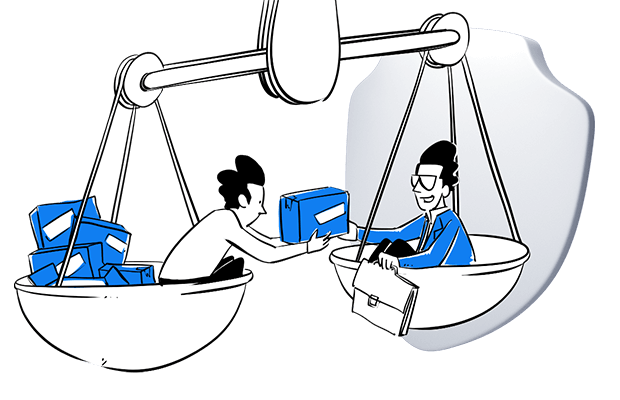Maciej Zawadziński: Big Tech has built their dominant position on the market with interconnected products and services. Nowadays, the quality of their offering has gotten even better. So why is Big Tech’s image worse than ever?
Tim Schumacher: In some ways, it seems an unavoidable reality due to the sheer size of Big Tech and public opinion about market dominance. Big Tech’s image is that it’s too big and too powerful. This has led to a global increase in antitrust scrutiny of these companies. Governments are now trying to play catch up with regulations to protect and benefit consumers. I’ve heard it said that it’s impossible to be online, and not to be in the orbit of Big Tech, because these companies are simply unavoidable. Consumers are wary of their reach and influence, yet dependent upon them. That combination makes some people nervous, especially surrounding questions of privacy or data usage, which arise more frequently nowadays.
It’s clear that this awareness is creating a new demand in the market. Users now want effective privacy tools. For us, that means finding creative ways to give users privacy while still allowing advertisers and publishers to reach their target audiences. That’s what our new product Crumbs does. It’s a privacy tool that puts users in control of their online identity by blocking tracking-cookies and allowing users to choose which information they want to share. But it’s done anonymously and in a privacy-friendly way so that no one can profile them as individuals. Also, Crumbs developed an Email Relay which allows users to create aliases to protect their main identifier on the web – a primary email address. Recently, we’ve also teamed up with the open-source protocol Fractal to better tackle privacy challenges and create even greater synergy for Crumbs users.

You might also like What is privacy-friendly analytics?
Maciej Zawadziński: Do you believe that the EU and Big Tech are at war over online privacy? Can you present briefly their standpoints and issues they agree and disagree on?
Tim Schumacher: This question touches on a very interesting issue. I can see a certain shift here: when GDPR was introduced back in 2018, there was a lot of criticism and backlash from (Big) Tech against the law. They said that GDPR is too burdensome and too expensive to implement, the fines are too high and the law will block innovation, etc. This perception has changed, as now many companies – even Big Tech companies – see GDPR as the “gold standard” of privacy laws and promote their own compliance programs. And many other data protection laws that followed GDPR, such as the California Consumer Privacy Act or the Brazilian LGPD, are actually introducing very similar concepts and requirements.
So, regarding the “war over online privacy”, I think that privacy started as a burdensome legal requirement, as many other regulatory endeavors. But since then it has also become a unique selling point for startups and companies with privacy-first products and solutions. eyeo not only complies with the GDPR standards but goes a step further, giving consumers choice over their data in many of our products, including our SDK, Crumbs and AdBlock Plus. None of our products track users’ browsing history. We don’t sell personal data to third parties. We also collect as little data as possible and only when it’s necessary to provide our services. Finally, we anonymize or pseudonymize data whenever possible.
This perception has changed, as now many companies – even Big Tech companies – see GDPR as the “gold standard” of privacy laws and promote their own compliance programs.
– Tim Schumacher
Maciej Zawadziński: Both in the EU and Australia Big Tech became a party in a dispute with the government. When and how Big Tech grew so big that it’s able to challenge governments? Could this be avoided?
Tim Schumacher: That’s a complicated question. In general, if power in any realm shifts at the speed in which Big Tech has grown, it’s hard to keep in check its impact and reach. After events at the US capitol in January, there were plenty of outcries for more regulations on vis-à-vis journalism and the spread of misinformation. This has of course contributed to the current situation with Facebook, Google and the Australian government. The proposed laws are set to reorient the conversation about vying company and governmental interests in regulating Big Tech. This means, in short, that Big Tech has grown so much (the ‘when’ is maybe less important because of the speed of growth) in size and influence that these questions of regulation have to be asked. That also essentially addresses the question of if this could have been avoided. In terms of industry, the Internet is relatively young and new technologies are being developed at breakneck speed. Plus, you have to consider that this is a global question, with differences in governmental actions allowing for different levels and methods of regulation.
There was an interesting article recently on the Ecosia Blog questioning Google’s market share and domination as a search engine, which is now even more prominent on Android due to Chrome’s position as the default browser (it’s something they pay for). The blog is about an open letter that Ecosia and other alternative search engines sent to the EU Commission asking for EU-wide regulation that would enable more players to come to the table. This is one of the ways of offering alternatives to Big Tech and trying to push the government to regulate it.
I would not say that European regulations have become too strict in general. While I agree that privacy requirements can be very burdensome for companies, especially SMEs and startups, I also see an opportunity here.
– Tim Schumacher
Maciej Zawadziński: Not only Big Tech, but all EU-based companies struggle to comply with GDPR. With the introduction of ePrivacy the challenge may get even bigger. Are the EU regulations getting too strict?
Tim Schumacher: I would not say that European regulations have become too strict in general. While I agree that privacy requirements can be very burdensome for companies, especially SMEs and startups, I also see an opportunity here. You mentioned the ePrivacy Regulation, which has become known as the “cookie law”. But even before ePrivacy, the wider ad tech ecosystem was moving away from third-party cookies toward new, innovative and privacy-friendly solutions. That was the case with our product Crumbs, as I’ve mentioned.
Also, the nice thing for us is that Crumbs was not intentionally designed as a response to GDPR, but is effectively compliant and even goes beyond the obligations of the privacy laws while innovatively supporting content creation. That was essentially the point for us – privacy was not something we saw as a hurdle or hindrance, but rather something we believe in. We wanted to offer an enhanced product that reflects our own mission in supporting a fair value exchange online. Privacy shouldn’t be separate from that.

You might also like 10 new privacy laws around the world and how they’ll affect your analytics
Maciej Zawadziński: Do you see an easy way out for Big Tech? If yes, what do they need to do to comply with the GDPR and other privacy laws around the world while keeping their business thriving?
Tim Schumacher: The easy way for Big Tech, or any other company (tech or otherwise), to succeed is to embrace the regulations as a challenge to be creative. These aren’t problems to overcome but opportunities to get ahead. In order to accomplish this, companies should follow some key privacy principles, no matter where they operate and what their business models are. For example, data minimization, which means collecting as little data as possible and only what is really needed. Or also purpose limitation, which means that companies only collect and use data for a specified and legitimate purpose. These are key principles that are not only important for GDPR, but for most privacy laws around the globe.
Maybe even more important, as I mentioned earlier, is that users are becoming more and more privacy aware. Take ad blocking, for example: studies show that most users that have installed an ad blocker are not against ads in general. However, they want to have ads that are not annoying or intrusive, and they do not want their privacy compromised. This is also why products like Adblock Plus choose to never track the browsing history of their users or sell user data to third parties. These products meet the growing users’ demand for privacy. This is something that increasingly more companies are (or should be) doing, and something we will continue to advocate for, as it is part of our company ethos. In the end, in order to thrive in this era of regulation, companies need to realize that their users are willing to share some of their personal data and see advertisements, but they want control over what they share and what they see. There’s opportunity in that space to not only succeed but to get ahead of the competition if the companies listen to what consumers want.
Tim Schumacher is a co-founder and was a longtime CEO of Sedo AG (sedo.com) – a publicly traded company with annual revenue of € 130M and approximately 350 employees. Since 2012, he has dedicated his professional career to the German start-up scene, acting both as business angel and mentor for young companies with economic potential. His current start-ups, among others, are eyeo/Adblock Plus, Aklamio and Ecosia.









